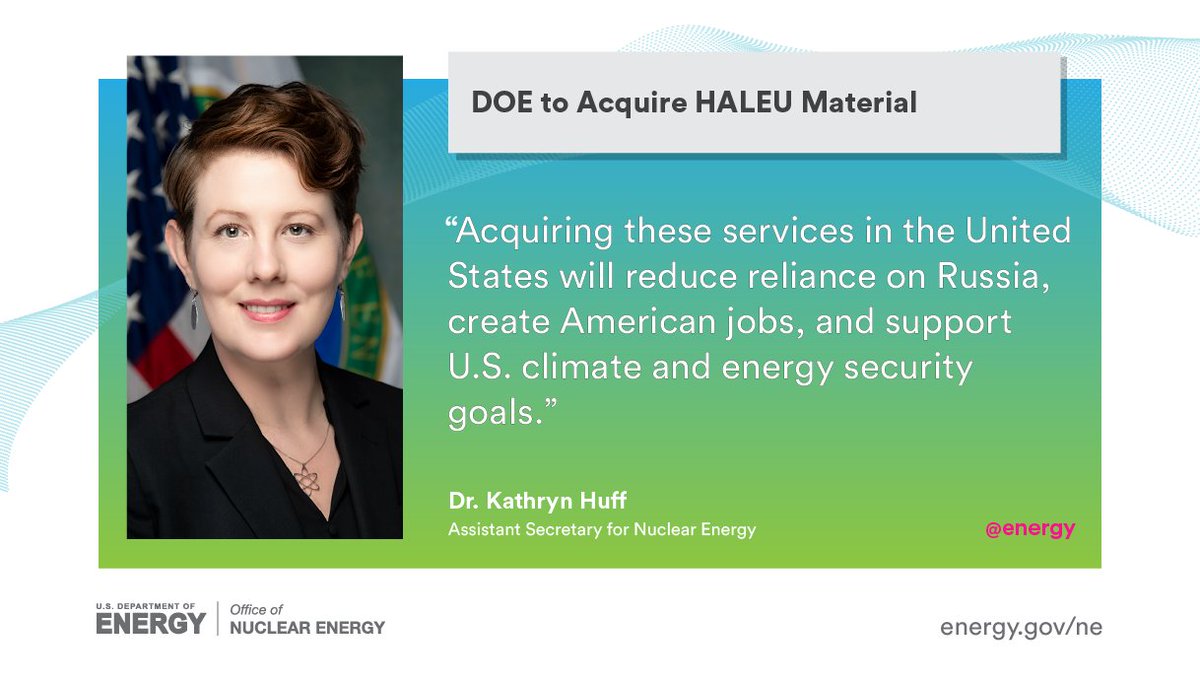
DOE says HALEU is a crucial material required by most US advanced reactors to achieve smaller designs, longer operating cycles, and increased efficiencies over current nuclear energy technologies. However, it is not currently available at commercial scale from domestic suppliers, which could significantly impact the development and deployment of advanced nuclear reactors.
Assistant Secretary for Nuclear Energy Dr Kathryn Huff said: “Spurring the nation’s capability to produce HALEU will set the stage for larger, commercial scale production. This will bring us closer to deploying advanced nuclear technologies in communities across the country.”
The 2020 Energy Act directs DOE to establish and implement a programme to support the availability of HALEU for civilian, domestic research, development, demonstration, and commercial use. The NOI, therefore, focuses on the acquisition of HALEU produced by a commercial entity using enrichment technology and making it available for commercial use or demonstration projects. HALEU is defined under the Energy Act as “uranium having an assay greater than 5.0 weight percent and less than 20.0 weight percent of the uranium-235 isotope.”
The DOE intends to prepare an EIS in accordance with NEPA and invites the public to comment on the scope of the draft EIS until 20 July.? DOE is also hosting three virtual scoping meetings to provide information on the NEPA process and proposed action, gather oral comments on the scope of the draft EIS, and enhance opportunities for public participation.
The development of a commercial HALEU fuel cycle would involve:
- uranium ore production
- conversion of the uranium ore into enrichment feed (converting the uranium ore into hexafluoride suitable for enrichment
- enrichment to HALEU (in particular, HALEU enriched to at least 19.75 and less than 20 weight percent U–235
- deconversion (conversion of the uranium hexafluoride into forms suitable for fuel fabrication
- transportation services for HALEU
- storage capability.
The EIS will evaluate implementation of the Proposed Action of facilitating the commercialisation of HALEU production and DOE's acquisition of HALEU, including the direct and reasonably foreseeable indirect effects of that acquisition.
Initially, existing DOE stockpiles of highly enriched uranium (HEU) could be processed or down-blended into HALEU to meet the requirements of the department's HALEU Availability Program, but as these stockpiles are depleted, production would need to be supplemented by or transition to commercially operated facilities. DOE recommends an initial public/private partnership to address “the high-fidelity” (high-confidence demand) HALEU market - such as fuel for demonstration reactors – plus some of the projected commercial demand for power reactors. "The private sector could incrementally expand the capacity in a modular fashion to establish HALEU enrichment and supply that are sufficient to meet future needs as a sustainable market develops," it says.
According to DOE, more than 40 tonnes of HALEU could be needed by 2030, with additional amounts required each year, to deploy a new fleet of advanced reactors.
Image courtesy of USDOE



